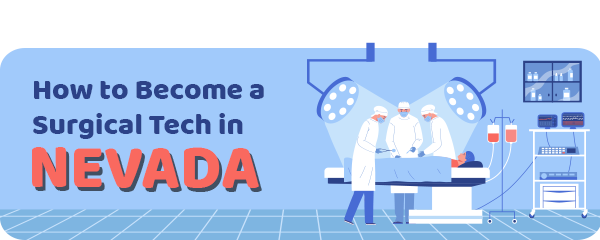
Nevada boasts a well-equipped surgery room with a dedicated team of healthcare professionals, always ready to respond swiftly, especially during emergency situations.
This specialized team includes:
- Surgeons
- Anesthesia specialist
- Surgical nurse
- Surgical technician
Their collaborative efforts commence before the surgery begins and persist until the conclusion of the surgical procedure.
From the list, the last is often referred to by various names, such as Operating Room (OR) technicians and Scrub Technicians.
Article Table of Contents
Job Description and Responsibilities of Surgical Technologists
Surgical technologists shoulder several crucial responsibilities during their shifts, which encompass:
- Preparing patients for surgery
- Transporting patients to and from the OR
- Preparing the OR with surgical equipment and supplies
- Monitoring the instrument count throughout surgery
- Handing the surgeon medical instruments
- Closing wounds and bandaging patients
It is essential to note that these duties merely scratch the surface of the extensive responsibilities assumed by these healthcare professionals.
Training and Education for Surgical Technologists
Aspiring surgical technologists in Nevada are not overseen by a single governing body; instead, their employers play a significant role in their training and education.
The path to becoming a surgical technologist in the state involves several critical steps:
The journey commences with high school graduation or the attainment of a GED (General Educational Development) equivalent.
Subsequently, individuals enroll in specialized training programs designed for this occupation, encompassing both educational coursework and hands-on clinical experience.
Several institutions offer these specialized training programs across Nevada.
While specific enrollment criteria may differ among these institutions, many share common prerequisites, including:
Coursework in subjects such as:
- Microbiology,
- Pathophysiology,
- Pharmacology,
- Anatomy,
- Physiology,
- Medical terminology.
Certification in Basic Life Support (BLS) and Automated External Defibrillator (AED) usage.
Bevill State Community College 
Bevill State Community College offers an all-encompassing program, covering topics such as:
- Sterile processing,
- Infection control
- Sterilization,
- Instrumentation identification,
- Safety
Classes are held on the college campus, and prospective students must meet certain prerequisites, including having a high school diploma or GED, passing the Accuplacer placement exam, and satisfying additional requirements.
Completing a specific number of clinical cases, with a significant portion in General Surgery and a “first scrub” role, is also mandatory.
Alternatively, meeting minimum scores on the ACT or Accuplacer exams is acceptable.
The program encompasses 29 credits and is tailored to equip students with the necessary knowledge and skills.
Nevada Career Institute 
This school presents a comprehensive Diploma program in Surgical Technology that can be successfully finished in a span of 60 weeks.
This educational journey encompasses both traditional classroom learning and practical hands-on training.
The entire program is offered at a cost of $31,358.
The College of Southern Nevada 
This school stands as the exclusive institution providing an Associate Degree program in Surgical Technology within the state of Nevada.
The program has total credits of 64.5 and offers financial aid for paying the tuition.
This program unfolds over two years and is accessible at an approximate cost of $7,284.
Not everyone will be accepted into the program, just those who meet certain criteria.
Calhoun Community College 
At Calhoun Community College, the training program is a two-year endeavor, divided into four semesters.
Students receive comprehensive education through classroom instruction, hands-on lab experiences, and clinical training.
Those aspiring to earn an AAS must complete an additional 18 credit hours in general education.
The admission process entails applying online, attending a program information session, and completing a Manual Dexterity Exam.
Meeting all of the college’s admission requirements is imperative for acceptance into the program.
| School Name | Address |
|---|---|
| Nevada Career Institute | 3231 North Decatur Blvd. #201 Las Vegas, NV 89130 |
| Bevill State Community College | online |
| The College of Southern Nevada | 700 College Dr. Henderson, NV 89002 |
| Calhoun Community College | online |
Becoming a Certified Surgical Technologist in Nevada
While certification is not a legal requirement, many employers in Nevada prefer candidates who have achieved professional certification.
A few different organizations offer certifications for surgical technologists in the state:
- National Surgical Assistant Association (NSAA)
- Provides the Certified Surgical Assistant (CSA) qualification
- National Board of Surgical Technology and Surgical Assisting (NBSTSA)
- Provides the Certified Surgical Technologist/Certified First Assistant credential
- National Center for Competency Training (NCCT)
- Provides the Tech in Surgery Certification
Among these certifications, the NBSTSA exam is particularly reputable and nationally recognized.
Testing centers can be found in multiple cities across Nevada.
The certification exam consists of 200 questions, with a minimum of 119 correct answers required to pass.
To take the exam, candidates must pay an associated fee, which is $190 for members of the Association of Surgical Technologists (AST) and $290 for non-AST members.
Certified surgical technologists must renew their certification every four years, which can be accomplished through one of the following methods:
Retaking the certification exam necessitates payment of the exam fee once more.
Completing continuing education courses, which require earning 60 education credits during the renewal period.
The renewal process also involves payment of a renewal fee.
Surgical Technologist Salaries in Nevada
The average annual salary for Operating Room (OR) technicians in the state hovers around $52,000.
Below, you’ll find a table detailing various cities in Nevada, showcasing the differences in earnings among surgical technologists compared to the state average.
Annual Salary Range:| Location | Avg. Annual Salary |
|---|---|
| Las Vegas | $52,300 |
| North Las Vegas | $52,300 |
| Sloan | $52,100 |
| Reno | $51,900 |
| Virginia City | $51,900 |
| Sun Valley | $51,900 |
| Boulder City | $51,600 |
| Alamo | $51,500 |
| Jean | $51,500 |
| Fallon | $51,100 |
Regional Salary in Nevada
| Region | Employed | Avg. Annual Salary | Avg. Hourly Pay | Top 10% Annual Salary | Bottom 10% Annual Salary |
|---|---|---|---|---|---|
| Las Vegas-Henderson-Paradise, NV | 780 | $69,870 | $33.59 | $96,750 | $45,060 |
| Reno, NV | 190 | $69,980 | $33.64 | $96,720 | $49,040 |
* Employment conditions in your area may vary.
Frequently Asked Questions
What Sills Do I Need To Work As A Surgical Tech in Nevada?
Here are the most important skills this profession requires:
- Able to work as part of a team
- Detail-oriented
- Able to work under pressure
- Understanding medical terms
- Understanding medical methodology
- Good communication skills
Where Do Surgical Technologists from Nevada Find Work?
These technologists usually work in a hospital’s surgery wing.
Furthermore, these other places also hire such specialists:
- Children’s hospitals
- Cosmetic surgery centers
- Specialty clinics for surgical procedures
Can a Surgical Tech From Nevada Choose a Specialty?
YES!
Just like surgeons can choose to operate on a specific body part, so can these techs.
Here are the most commonly chosen surgery niches:
- General surgery,
- Ob/gyn,
- Urology,
- Plastics,
- Neurology
Read the full guide: How to Become a Surgical Technologist